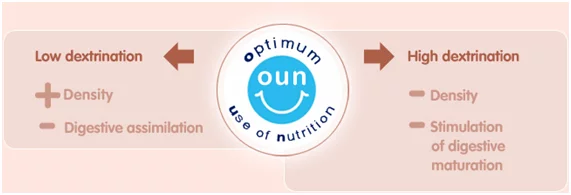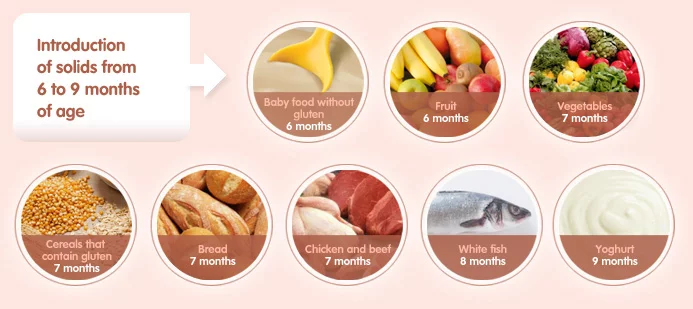Food
The growth of the first teeth is a turning point. Apart from moving on to follow-up milks (stage-two milks), little by little you can introduce new food types and thicker textures, such as a light purée. Welcome to the adventure of new flavours!
New recipes for babies who are full of energy
At this stage babies grow fast. Their height and weight vary from one month to the other and this is why they need food with a higher nutrient and calorie content. Their daily needs in energy go from 550kcal/day during the 1st month of life to 765kcal/day when they reach their 6th month, and then jump to 1050kcal/day at 12 months of age. This together with the fact that they now learn to chew is why you should introduce new food types into their diet that include the semi-solid textures of purées. At the same time you should continue feeding them a quantity of milk or dairy products equivalent to 500ml/day to meet their needs in calcium.
The introduction of new food types is an exciting time for your baby, but do follow the guidelines your paediatrician gives you.
7 months:
Cereals that contain gluten. This is the time to introduce wheat, barley, rye, millet, sorghum, and oats, and combine them with fruit and vegetables. You can gradually replace one spoonful of their usual cereals with one containing gluten until you reach the point when the whole meal is made only with cereals containing gluten. Another option is to add 2-3 biscuits, but choose only those that contain no egg and no ingredients which are still unfamiliar to your baby. You can also combine them with yoghurt and create new recipes that will no doubt delight you child!
As to meat, start with boiled chicken and turkey with no skin, which are the easiest to digest. If your baby tolerates them well, after two weeks you can try feeding her tender lean beef, and later lean ox in 20-30-gram portions.
From the 8th month onwards
You can change the purée's texture by adding solid foods which you can crush with a fork. This is also a good time to try tomatoes (poached without skin or seeds) and natural yoghurt, which is an excellent source of proteins, calcium, vitamins, and minerals that help develop the intestinal flora. At mealtimes, encourage the baby's independence: Allow her to pick up soft food with her hands. See how she brings it to her mouth and tries to chew it.
At the age of 9 months
You can add to their diet spinach, cauliflower, red cabbage, beetroot, celeriac, and white fish. Specifically, sole, hake, and similar types of fish mixed with vegetables, at first in small quantities just in case there are any allergic reactions. Both fresh and frozen fish have a high level of nutrients, such as iodine, proteins, phosphorous, and calcium, as well as a large quantity of polyunsaturated fatty acids omega-3. This is also a good time to introduce food prepared using corn semolina, crushed soup pasta, and the first pulses.
Follow-up formulas
The moment the baby starts feeding on solids marks the change to follow-up milks, which have formulations that are close to breast milk. This type of milk nourishes babies aged 6 months and above with a high level of nutrients. They meet their nutritional needs and help establish a balanced diet.
Dextrination
To adapt baby food to the nutritional needs and degree of maturation of your baby Laboratorios Ordesa has developed an exclusive dextrination process that allows for an optimum use of the nutrients that are present in the cereals.

New types of food

Feeding the body's defenses
An adequate diet is essential to a good functioning of the baby's natural defenses, and some nutrients are especially important.
> Bioactive serum proteins
These proteins are found in breast milk. Among them we find immunoglobulins and lactoferrin, which help the baby's defenses by disabling toxins, getting rid of harmful bacteria and viruses, and hindering the growth of non-beneficial microorganisms.
> Nucleotides
They are important for the maturation of the tissue and of the processes still under development, such as the digestive system and the natural defenses, and they help in making them function correctly.
> Prebiotics (fructooligosaccharides and galactooligosaccharides ) and probiotics (lactobacillus and bifidobacteria)
They improve the intestinal flora balance via the maturation of the digestive function and of the natural defenses, as well as help with mineral and vitamin absorption. At an immunological level experts consider its influence beneficial, as they reduce bowel infections. Studies are also being conducted on its beneficial role in children with food allergies and atopy problems.
> Long chain polyunsaturated fatty acids, carnitine, taurine,... are present at high concentration levels in the brain structure and the retina, which is why experts believe they affect maturation and development of these organs and tissues.